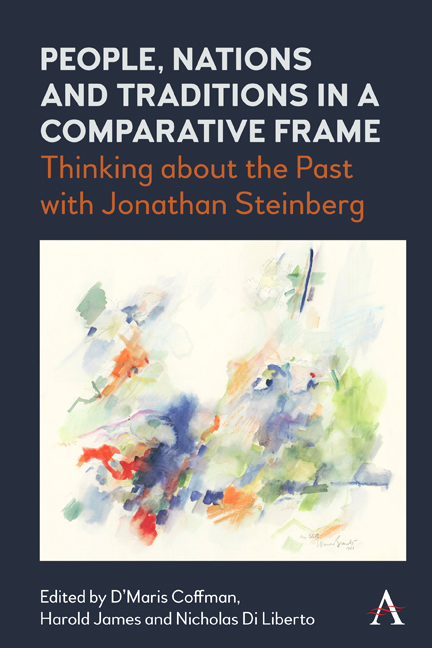 People, Nations and Traditions in a Comparative Frame
People, Nations and Traditions in a Comparative Frame Book contents
- Frontmatter
- Contents
- Foreword
- Acknowledgements
- Notes on Contributors
- Introduction
- Part One Methodological Pluralism and New Applications
- Part Two Personal and National Character
- Part Three Society, Families and the Sovereign Self
- Part Four History Out of Sync: Modernity and Tradition
- Part Five History, Narrative and the Human Condition
- Afterword
- Bibliography of Jonathan Steinberg’s Works
- Index
Chapter Five - Clarendon’s Exile and the Role of Personality in Historical Explanation
Published online by Cambridge University Press: 23 February 2022
- Frontmatter
- Contents
- Foreword
- Acknowledgements
- Notes on Contributors
- Introduction
- Part One Methodological Pluralism and New Applications
- Part Two Personal and National Character
- Part Three Society, Families and the Sovereign Self
- Part Four History Out of Sync: Modernity and Tradition
- Part Five History, Narrative and the Human Condition
- Afterword
- Bibliography of Jonathan Steinberg’s Works
- Index
Summary
As others have noticed, Jonathan Steinberg's work is noteworthy for his embrace of methodological pluralism. Steinberg did not think that history had native methodologies, believing instead that historical writing derives distinctiveness from its discursive conventions and epistemological claims. He thus welcomed and embraced methods imported from the other social sciences. While I was in graduate school at Penn, he encouraged me to master social and critical theory as tools for interpreting the importance of historical findings to the concerns of the present, whilst reminding me that historical explanation must leave room for contingency and for what Chris Clark has called the ‘irreducibility of personality’.
At the same time, Steinberg was fascinated with biography and life-writing, and his late-life masterpiece, Bismarck: A Life, followed on from his 36 lectures for the Teaching Company entitled European History and European Lives: 1715 to 1914. Unsurprisingly, in his long career, Steinberg was interested in more than just those figures whose 35 lives informed his short portraits, and the constraints of space and chronology precluded at least one figure of lingering attention – Edward Hyde, the first Earl of Clarendon, whose own pen portraits had first captivated Jonathan with the genre of short biography that reached its zenith with Leslie Stephen's Dictionary of National Biography. Clarendon held an appeal for Jonathan, especially during his years in Cambridge, where his friendships with Owen Chadwick and John Morrill helped him understand how the English Civil Wars could indeed be considered the last of the European wars of religion. Part of what held such fascination for Steinberg was the sense in which Clarendon (who for Steinberg was a kind of English Bismarck) could be said to be one of the forefathers of the modern Conservative Party, despite having spent the 1670s in exile when the Whigs and Tories first emerged, in the wake of the Exclusion Crisis, as factional rivals and ideological enemies. Steinberg never had time to investigate this in detail, but he did suggest to me that surely part of the answer might lay in Clarendon's personality, which his literacy legacy, historical, autobiographical and personal, laid bare and later immortalized for his immediate contemporaries and for eighteenth-century consumers of printed editions of his works. Or, to put it another way, to understand how the English consumed Clarendon's politics, one has to understand how they consumed his life.
- Type
- Chapter
- Information
- People, Nations and Traditions in a Comparative FrameThinking about the Past with Jonathan Steinberg, pp. 73 - 88Publisher: Anthem PressPrint publication year: 2021


